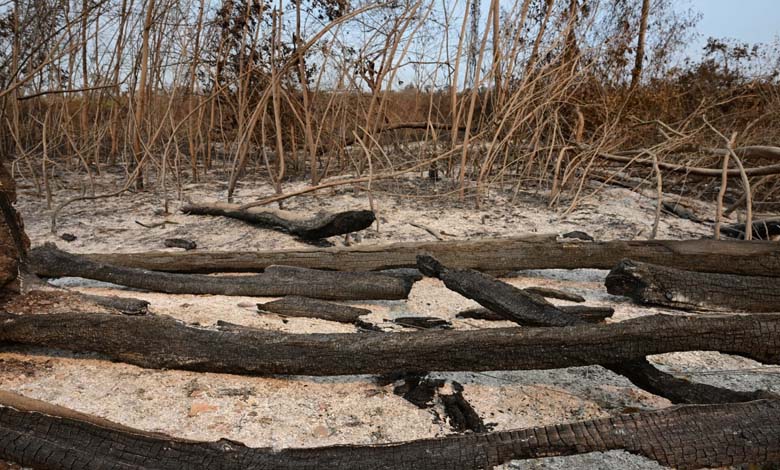Fires Threaten the Lifestyle of the “Guardians” of Brazil’s Pantanal Region

A traditional local community on the banks of the Paraguay River has survived the forest fires that have been raging in Brazil’s Pantanal region for weeks. However, the way of life of the “guardians” of this biodiversity reserve remains threatened, according to “Agence France-Presse.”
Virginia Paes, 55, who volunteered with firefighting teams to help extinguish the fires and is the president of the “Women Producers in the Baía Negra Reserve” association, said, “The river was the only thing that separated us from the flames. On the other side, the fire consumed everything.”
She added, “We haven’t fully recovered from the fires of 2020, and now we are facing this problem again.”
This community consists of 28 families who make their living from fishing, handicrafts, wild industry, and ecotourism in Ladário in the state of Mato Grosso do Sul in central-western Brazil.
It is located within the Baía Negra Ecological Reserve, the first reserve in the Pantanal region, the largest wetland on Earth, south of the Amazon.
In 2020, the year in which the Pantanal region experienced its worst fires in history, 50% of the reserve was damaged by fire.
Last month, the fires approached the reserve and consumed the vegetation on Bracinho Island on the other side of the river. However, the community was not spared from the smoke that daily affects the residents’ health. Paes said, “We can barely breathe.”
Fishing in Danger
The Pantanal region has recorded 3,528 fires since the beginning of 2024, a record number for the first half of the year, a phenomenon exacerbated by the exceptional drought waves linked, according to experts, to climate change.
However, the authorities attribute these fires to human activity, particularly the practice of burning for agricultural expansion.
André Luiz Siqueira of the NGO “ECOA,” which has been active in the region for 30 years, considers the members of traditional local communities to be the true guardians of the ecosystems they live in.
He added, “I fear that within a few years, we will see climate change refugees in the Pantanal region.”
The Baía Negra Reserve, established in 2010, spans more than 5,400 hectares and is home to species linked to the area, such as the caiman, the jaguar, and the capybara, the world’s largest rodent.
The fires directly threaten an essential activity for the survival of this community: fishing. The smoke poisons the fish, while the riverbed has significantly lowered due to drought.
Marcelo Henrique, 33, said, “Fishing has become more difficult, and we can no longer find fish. I used to live off fishing, but now I work as an industrial furnace operator at a factory in Ladário.”
“Jaguar Threat”
Renato Andrade, 52, recalls the time when fishing was abundant in the reserve. Currently, the shortage affects not only the residents but also the jaguars, which lack prey.
-
Australia’s bushfires have degraded the ozone layer
-
Developments of the Massive Fire at a Battery Factory in South Korea
He added, “Before the major fires (in 2020), we didn’t hear about jaguar attacks in the surrounding area, but now I hear them howling near my house.”
As a result, community members impose a kind of curfew on themselves. Andrade continued, “At night, we must stay indoors. From 6:30 PM, residents avoid going out; we are very scared. Living here has become dangerous due to the lack of natural prey for jaguars, such as capybaras.”
-
To Avoid “Overtourism,” Switzerland Attempts to Control Visitor Numbers
-
Five Killed, Dozens Injured in Gas Line Explosion in Turkey
Even pets fall victim to jaguars. Andrade explained, “I can’t count the number of dogs eaten by jaguars.”












